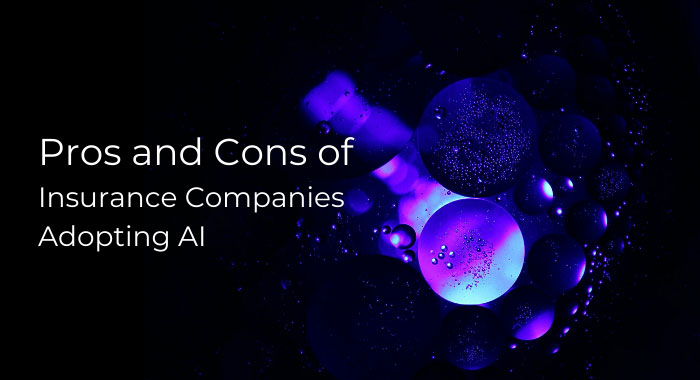Advanced technologies have changed our lives for the better, and the same applies to artificial intelligence.
Intelligent machines and algorithms have already disrupted numerous industries, allowing companies to reduce their expenses, improve their customer experience, and gain a competitive edge. The insurance sector jumped on the AI bandwagon, but this seismic shift still hasn’t reached its full potential.
But, before we witness a full-blown transition to AI, insurance executives will have to take into consideration that this change will have a significant impact on the claims and underwriting systems, as well as distribution and pricing.
That’s why it’s essential to discuss both pros and cons of AI adoption in the insurance industry.

Pros
Data from IoT
Access to relevant data on their customers is crucial for insurance companies.
Not so long ago, it was hard to collect information, let alone analyze, process, and make sense of it.
These days, the Internet of Things provides access to an avalanche of new data from interconnected devices such as wearables, smart vehicles, intelligent virtual assistants, smartphones, home appliances, and other gadgets. It’s estimated that by 2030, there will be 125 billion devices connected to the internet.
Another important factor lies in the synergy of big data analytics and AI – all the data that companies collect with the help of IoT and other sources won’t be of much use if it can’t be properly analyzed and processed. Since we’re talking about unstructured, semi-structured, and structured data, regular analytics can’t be used – but big data analytics is capable of identifying hidden patterns in any type of data and provide valuable insights.
So, with all these new technologies, it’s possible to tap into a massive pool of customer information and gain a much better understanding of risks, avoiding potential losses that can be prevented.
For example, if a customer wears a fitness tracker connected to an actuarial database, an insurance company will be able to calculate that particular customer’s personal health risk score based on their body weight, heart rate, and level of activities.
Generally speaking, wearables allow insurance carriers to monitor how every particular customer behaves and, for example, offer lower premiums for less risky behaviors such as exercising more and driving less.
Improving Customer Relationship

Customer service plays an important role in preventing churn.
Helping customers find answers to their questions and solutions to their product or service issues should be one of the top priorities of every business. But, bearing in mind that 67% of people prefer self-service over talking to a support rep shows why intelligent chatbots can disrupt the insurance industry too.
Namely, they could offer all the information about different insurance policies and help potential clients navigate through the challenges of both the pre- and post-sale customer journey.
Insurance chatbots are available at all times and can serve multiple clients simultaneously, which reduces friction. This allows support reps to focus on more complex queries that call for critical thinking, while chatbots can handle insurance policy questions, filing claims, new policy suggestions, or regular customer service issues.
Besides, chatbots can gather customer data and personalize conversations, thus offering tailored customer experiences.
A Faster and Safer Claims Management Process
Insurance companies need to have a stellar reputation, and efficiency in settling claims is one of the most important factors for customer satisfaction.
AI provides automated claim support and speeds the entire process by leveraging visual analytics. In other words, claim settlement is facilitated with the help of damage assessment through photos and videos.
Besides, let’s not forget that insurance companies have to handle a number of claims on a daily basis. Therefore, intelligent chatbots that can take over the filing process and visual analytics that can accelerate damage assessment will significantly boost the claims management process.
As for safety, AI can be successfully used in detecting and preventing fraud.
Cons
Although AI is expected to become indispensable in the insurance industry, there are a couple of challenges that have to be addressed.
Loss of Privacy

With such a huge amount of data being collected, stored, and analyzed, there’s a reasonable concern over the loss of privacy.
Insurance companies have to be very careful about protecting their customers’ data and using it only for risk assessment purposes. Unfortunately, this data can be sold to third parties, as marketers, political parties, or different government institutions can be very interested in having it.
In order to prevent this from happening, insurance companies need to legally protect their customers and never use their sensitive data without their informed consent.
Discrimination
Profiling is another issue that has to be taken into consideration.
The very fact that someone belongs to a particular demographic group can determine their insurance risk as higher or lower.
Given that there are hundreds of risk factors that AI algorithms analyze and organize into clusters on their own, it’s possible to discriminate some people unintentionally, for example, because they live in a poorer neighborhood or are of a certain ethnicity or race.
Full HD Webcam with Built-in Microphone and Rotatable Tripod
Full HD Video and Wide Angle Lens - The Tewiky High Definition 1080p Webcam features a wide angle lens and delivers crisp clear images and fluid video at 30 frames per second while gaming, video calling, online teaching, live streaming, or recording.
We earn a commission if you click this link and make a purchase at no additional cost to you.
Volatile Pricing
Apart from generalized and stereotypical discrimination, AI is also prone to uncover certain genetic predispositions in people and discriminate them on a more personal level.
By obtaining sensitive information about their clients’ DNA and dispositions to certain health issues and illnesses, insurers can decide to increase premiums.
Similarly, insurance companies can take advantage of having an insight into their customers’ spending habits and resort to opportunistic pricing – people who are willing to spend more and pay full price will face higher premiums.
It’s clear that the insurance industry can greatly benefit from implementing AI and other related technologies, but it has to be mindful of the challenges this shift brings and find a solution for them.

Author Bio: Michael Deane
Michael has been working in marketing for almost a decade and has worked with a huge range of clients, which has made him knowledgeable on many different subjects. He has recently rediscovered a passion for writing and hopes to make it a daily habit.

